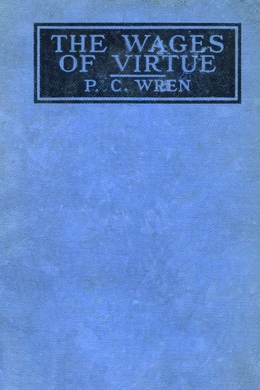
-
EPUB 355 KB
-
Kindle 434 KB
-
Support epubBooks by making a small $2.99 PayPal donation purchase.
Description
Sir Montague Merline and his platoon get into a bloody combat in Africa and they are all massacred except for one man. Since her husband is presumed dead, Lady Merline remarries, but Montague emerges a couple of years later in some African village, with no memory. After finding out about his wife’s new life, he decides not to ruin her happiness and goes off to join French Foreign Legion. The descriptions of Legion garrison life closely match those contained in the autobiographical In the Foreign Legion by ex-legionnaire Edwin Rosen.
347 pages with a reading time of ~5.50 hours (86848 words), and first published in 1916. This DRM-Free edition published by epubBooks, 2017.
Community Reviews
There are currently no other reviews for this book.
Excerpt
Sir Montague Merline, second-class private soldier of the First Battalion of the Foreign Legion of France, paused to straighten his back, to pass his bronzed forearm across his white forehead, and to put his scrap of soap into his mouth–the only safe receptacle for the precious morsel, the tiny cake issued once a month by Madame La République to the Legionary for all his washing purposes. When one’s income is precisely one halfpenny a day (paid when it has totalled up to the sum of twopence halfpenny), one does not waste much, nor risk the loss of valuable property; and to lay a piece of soap upon the concrete of Le Cercle d’Enfer reservoir, is not so much to risk the loss of it as to lose it, when one is surrounded by gentlemen of the Foreign Legion. Let me not be misunderstood, nor supposed to be casting aspersions upon the said gentlemen, but their need for soap is urgent, their income is one halfpenny a day, and soap is of the things with which one may “decorate oneself” without contravening the law of the Legion. To steal is to steal, mark you (and to deserve, and probably to get, a bayonet through the offending hand, pinning it to the bench or table), but to borrow certain specified articles permanently and without permission is merely, in the curious slang of the Legion, “to decorate oneself.”
Contrary to what the uninitiated might suppose, Le Cercle d’Enfer–the Circle of Hell–is not a dry, but a very wet place, it being, in point of fact, the lavabo where the Legionaries of the French Foreign Legion stationed in Algeria at Sidi-bel-Abbès, daily wash their white fatigue uniforms and occasionally their underclothing.
Oh, that Cercle d’Enfer! I hated it more than I hated the peloton des hommes punis, salle de police, cellules, the “Breakfast of the Legion,” the awful heat, monotony, flies, Bedouins; the solitude, hunger, and thirst of outpost stations in the south; I hated it more than I hated astiquage, la boîte, the chaussettes russes, hospital, the terrible desert marches, sewer-cleaning fatigues, or that villainous and vindictive ruffian of a cafard-smitten caporal who systematically did his very able best to kill me. Oh, that accursed Cercle d’Enfer, and the heart-breaking labour of washing a filthy alfa-fibre suit (stained perhaps with rifle-oil) in cold water, and without soap!
Only the other day, as I lay somnolent in a long chair in the verandah of the Charmingest Woman (she lives in India), I heard the regular flop, flop, flop of wet clothes, beaten by a distant dhobi upon a slab of stone, and at the same moment I smelt wet concrete as the mali watered the maidenhair fern on the steps leading from Her verandah to the garden. Odours call up memories far more distinctly and readily than do other sense-impressions, and the faint smell of wet concrete, aided as it was by the faintly audible sound of wet blows, brought most vividly before my mind’s eye a detailed picture of that well-named Temple of Hygiea, the “Circle of Hell.” Sleeping, waking, and partly sleeping, partly waking, I saw it all again; saw Sir Montague Merline, who called himself John Bull; saw Hiram Cyrus Milton, known as The Bucking Bronco; saw “Reginald Rupert”; the infamous Luigi Rivoli; the unspeakable Edouard Malvin; the marvellous Mad Grasshopper, whose name no one knew; the truly religious Hans Djoolte; the Russian twins, calling themselves Mikhail and Feodor Kyrilovitch Malekov; the terrible Sergeant-Major Suicide-Maker, and all the rest of them. And finally, waking with an actual and perceptible taste of soap in my mouth, I wished my worst enemy were in the Cercle d’Enfer, soapless, and with much rifle-oil, dust, leather marks and wine stains on his once-white uniform–and then I thought of Carmelita and determined to write this book.
For Carmelita deserves a monument (and so does John Bull), however humble…. To continue….
Sir Montague Merline did not put his precious morsel of soap into his pocket, for the excellent reason that there was no pocket to the single exiguous garment he was at the moment wearing–a useful piece of material which in its time played many parts, and knew the service of duster, towel, turban, tablecloth, polishing pad, tea-cloth, house-flannel, apron, handkerchief, neckerchief, curtain, serviette, holder, fly-slayer, water-strainer, punkah, and, at the moment, nether garment. Having cached his soup and having observed “Peste!” as he savoured its flavour, he proceeded to pommel, punch, and slap upon the concrete, the greyish-white tunic and breeches, and the cotton vest and shirt which he had generously soaped before the hungry eyes of numerous soapless but oathful fellow-labourers, who less successfully sought that virtue which, in the Legion, is certainly next to, but far ahead of, mere godliness.
